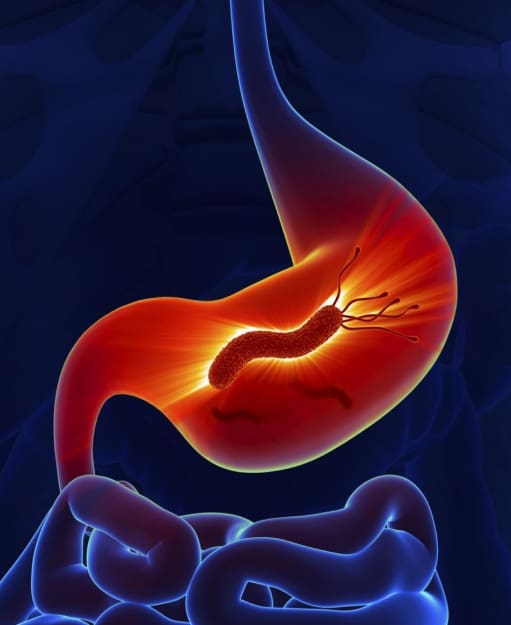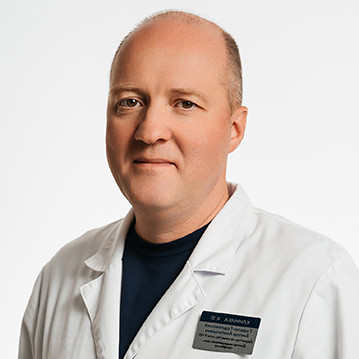Gastritis with Helicobacter

specialists

equipment

treatment

About the disease
In 2005, the Nobel Prize in Medicine was awarded to two scientists whose names will forever remain in the history of gastroenterology. R. Warren and B. Marshall were the first to prove that gastritis, in the vast majority of cases (more than 90%), is caused by the bacterium Helicobacter pylori (H. pylori, HP). This conclusion radically changed the attitude to the etiology and pathogenesis of this disease, but even more changed the approaches to treatment that had already been established at that time.
The spiral-shaped gram-negative bacterium Helicobacter pylori is a unique microorganism that can survive in the acidic environment of the stomach. Infecting not only the stomach, but also the duodenum, H. pylori can cause gastritis, duodenitis, gastroduodenitis, gastric ulcers and duodenal ulcers, and oncopathology of these localizations.
In order to survive in the acidic conditions of the stomach, Helicobacter pylori has several important properties.
First: a spiral shape and the presence of flagella. After entering the stomach, these devices allow Helicobacter to penetrate the protective layer of mucus and stop right at the epithelial cells of the mucous membrane.
Second: Helicobacter is able to produce urease, which breaks down urea into ammonia and other compounds. Urea is always present in the gastric contents in small concentrations, but for H. pylori this is enough to neutralize the hydrochloric acid around itself with the resulting ammonia.
In addition, Helicobacter pylori produces a number of its own enzymes that dissolve the protective layer of gastric mucus, thereby exposing the cells of the mucous membrane and exposing them to the aggressive action of its own gastric juice. Helicobacter also secretes endotoxins, which have a direct damaging effect on the cells of the stomach.
All these factors together lead to damage to the gastric wall and the occurrence of an inflammatory reaction in it - gastritis, which today is one of the most common diseases of the gastrointestinal tract, and this pathology is increasingly found in young people.
Indication for the search for Helicobacter pylori - the presence of symptoms of gastritis or other inflammatory diseases of the stomach and duodenum. The search for Helicobacter for preventive purposes does not carry much diagnostic value, since about 90% of people among the entire population infected with this bacterium do not have any symptoms of the disease and are only carriers of H. pylori.
All methods of diagnosing Helicobacter pylori can be divided into invasive and non-invasive.
Among the invasive methods is an endoscopic examination of the stomach with a biopsy. The obtained section of the mucous membrane undergoes biochemical testing for the presence of urease, immunological testing to search for bacterial antigens, and histological testing to directly visualize Helicobacter and obtain its quantitative characteristics. Non-invasive methods for determining Helicobacter include immunological tests and abbreviated breath tests. Immunological tests are used to determine the titer of antibodies to H. pylori in the blood and the antigens of this bacterium in the feces.
There are two types of abbreviated breath tests. In one case, urea with radioactive carbon is used, in the other, simple carbamide. The latter method, due to its harmlessness and speed of implementation, is gaining wide popularity and can be used in children. Performing a breath test for Helicobacter pylori allows you to determine the level of ammonia in the exhaled air and, based on this, draw a conclusion about the infection of the stomach with H. pylori.

Appointment to the doctor
Helicobacter eradication methods
To remove Helicobacter pylori from the body, gastroenterologists at the K+31 clinic prescribe a three-component therapy, including an antisecretory drug and two antibiotics (clarithromycin and amoxicillin).
We focus on the health of our patients, so to monitor the effectiveness of treatment, we recommend conducting a urea breath test for Helicobacter, or other methods for detecting this infection.
If this treatment is ineffective, they switch to four-component therapy (antisecretory drug, bismuth drug, metronidazole and tetracycline).
If in this case the eradication of Helicobacter pylori remains unsuccessful, then to continue the therapy the sensitivity of the bacteria to specific antibiotics is determined and then prescribed.
Make an appointment at a convenient time on the nearest date
Our doctors

This award is given to clinics with the highest ratings according to user ratings, a large number of requests from this site, and in the absence of critical violations.

This award is given to clinics with the highest ratings according to user ratings. It means that the place is known, loved, and definitely worth visiting.

The ProDoctors portal collected 500 thousand reviews, compiled a rating of doctors based on them and awarded the best. We are proud that our doctors are among those awarded.




















